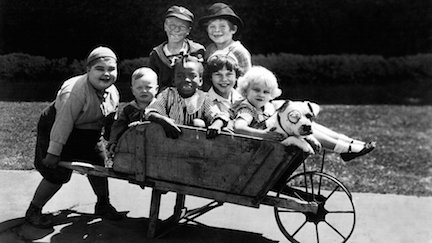Summary | Excerpt | Reading Guide | Discuss | Reviews | Beyond the Book | Read-Alikes | Genres & Themes | Author Bio

This article relates to The Sellout
 One of the central characters in The Sellout is Hominy Jenkins, an elderly black man who was, in his youth, a lesser-known member of the group of child actors featured in the Our Gang series of short films. Hominy Jenkins might be fictional, but Our Gang was certainly not. Produced from 1922 to 1944 by comedy producer Hal Roach, the original films (many of which later made it to television under the title Little Rascals) began as silent movies and ultimately encompassed more than two hundred shorts as well as a feature-length movie.
One of the central characters in The Sellout is Hominy Jenkins, an elderly black man who was, in his youth, a lesser-known member of the group of child actors featured in the Our Gang series of short films. Hominy Jenkins might be fictional, but Our Gang was certainly not. Produced from 1922 to 1944 by comedy producer Hal Roach, the original films (many of which later made it to television under the title Little Rascals) began as silent movies and ultimately encompassed more than two hundred shorts as well as a feature-length movie.
 Among the most memorable, long-standing characters were Alfalfa, Spanky, Porky, Darla, Farina, and Buckwheat. The films – and consequently their child stars – were phenomenally popular. Featuring child actors in comedic situations, the films were notable for featuring a relatively diverse cast – including both white and black characters as well as Asian-American and Italian-American children – at a time when racial tensions in the United States were particularly fraught.
Among the most memorable, long-standing characters were Alfalfa, Spanky, Porky, Darla, Farina, and Buckwheat. The films – and consequently their child stars – were phenomenally popular. Featuring child actors in comedic situations, the films were notable for featuring a relatively diverse cast – including both white and black characters as well as Asian-American and Italian-American children – at a time when racial tensions in the United States were particularly fraught.
 In her recent book Our Gang: A Racial History of The Little Rascals, Julia Lee traces the racial imagery used in the films themselves as well as the reception of their African-American stars. She notes that, especially when viewed with contemporary eyes, the films utilize numerous racist stereotypes, often for humor; on the other hand, however, the films portrayed children of different races playing together as equals, imagery that had not been previously seen on screen (and that got the films banned from some Southern theaters). By recalling the history of Our Gang and its complicated balancing act between minstrelsy and a sort of progressivism, Beatty gives readers hints as to the kind of playfulness and complicated cultural commentary his novel engages in as well.
In her recent book Our Gang: A Racial History of The Little Rascals, Julia Lee traces the racial imagery used in the films themselves as well as the reception of their African-American stars. She notes that, especially when viewed with contemporary eyes, the films utilize numerous racist stereotypes, often for humor; on the other hand, however, the films portrayed children of different races playing together as equals, imagery that had not been previously seen on screen (and that got the films banned from some Southern theaters). By recalling the history of Our Gang and its complicated balancing act between minstrelsy and a sort of progressivism, Beatty gives readers hints as to the kind of playfulness and complicated cultural commentary his novel engages in as well.
The Gang: Ernie "Sunshine Sammy" Morrison, Andy Samuel, Allen "Farina" Hoskins, Mickey Daniels and Joe Cobb in a 1923 still from one of the earliest comedies.
Poster of the movie Our Gang.
The Gang, courtesy of Hollywood Reporter.
Filed under Music and the Arts
![]() This article relates to The Sellout.
It first ran in the January 18, 2017
issue of BookBrowse Recommends.
This article relates to The Sellout.
It first ran in the January 18, 2017
issue of BookBrowse Recommends.
A truly good book teaches me better than to read it...
Click Here to find out who said this, as well as discovering other famous literary quotes!
Your guide toexceptional books
BookBrowse seeks out and recommends the best in contemporary fiction and nonfiction—books that not only engage and entertain but also deepen our understanding of ourselves and the world around us.